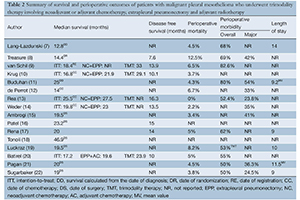Systematic review of trimodality therapy for patients with malignant pleural mesothelioma
Abstract
Background: Malignant pleural mesothelioma (MPM) is an aggressive form of cancer arising from the pleural mesothelium. Trimodality therapy (TMT) involving extrapleural pneumonectomy with neoadjuvant or adjuvant chemotherapy and adjuvant radiotherapy is a recognized treatment option with a curative intent. Despite encouraging results from institutional studies, TMT in the treatment of MPM remains controversial. The present systematic review aims to assess the safety and efficacy of TMT in the current literature.
Methods: A systematic review was performed using five electronic databases from 1 January 1985 to 1 October 2012. Studies were selected independently by two reviewers according to predefined selection criteria. The primary endpoint was overall survival. Secondary endpoints included disease-free survival, disease recurrence, perioperative morbidity and length of stay.
Results: Sixteen studies were included for quantitative assessment, including one randomized controlled trial and five prospective series. Median overall survival ranged from 12.8-46.9 months. Disease-free survival ranged from 10-16.3 months. Perioperative mortality ranged from 0-12.5%. Overall perioperative morbidity ranged from 50-82.6% and the average length of stay was 9-14 days.
Conclusions: Outcomes of patients who underwent TMT in the current literature appeared to be inconsistent. Four prospective series involving a standardised treatment regimen with neoadjuvant chemotherapy indicated encouraging results based on intention-to-treat analysis. However, a small study assessing the feasibility of conducting a randomized controlled trial for TMT versus conservative treatment reported poor short- and long-term outcomes for patients who underwent pneumonectomy. Overall, results of the present systematic review suggest TMT may offer acceptable perioperative outcomes and long-term survival in selected patients treated in specialized centers.
Cover






